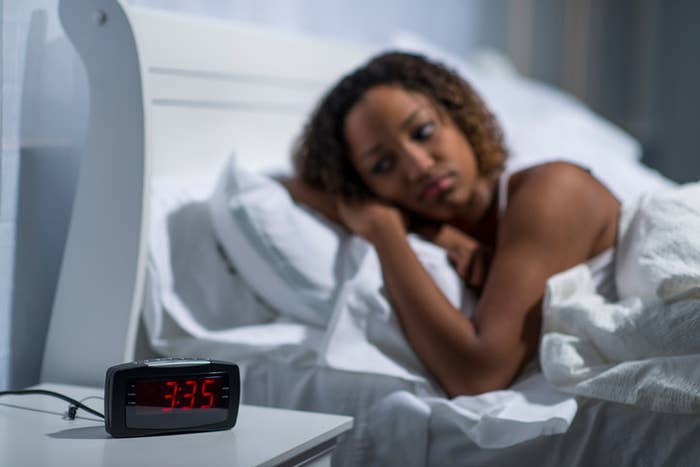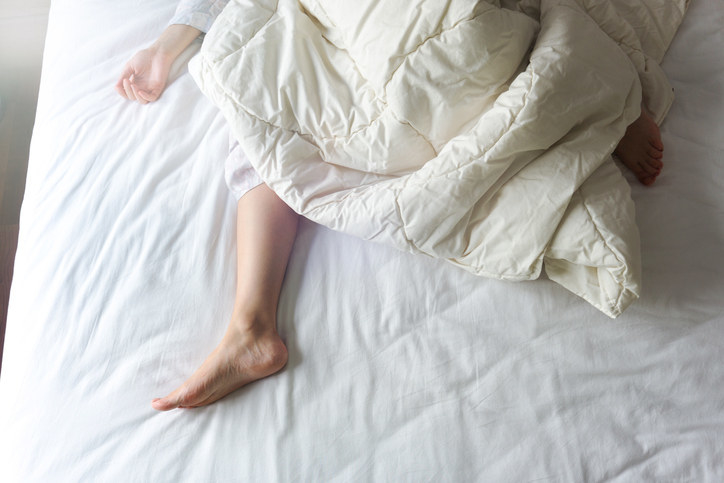
Let me paint a picture that might be all-too familiar: You fall asleep quickly at night, and then, Boom! — you wake up a few hours later, and find that it's almost impossible to doze off again.

If that description made you say, "Yep, me," then you might have what's called sleep maintenance insomnia, a common — and really annoying — sleep issue.
A 2010 study published in Sleep Medicine found that about a third of American adults wake up during the night at least three times a week, and more than 40% of that group might have trouble falling asleep again.
Apparently, there is a multitude of reasons why this happens.
"It could be caused by a lot of factors, including teeth grinding, restless legs, acid reflux, sleep apnea, snoring, a pet, overactive bladder, alcohol, or many other things," Dr. W. Christopher Winter, neurologist and author of The Sleep Solution, tells BuzzFeed. Add depression, aging, an overactive thyroid gland, and light pollution to the mix, and it's hard to imagine anyone who doesn't pop their eyes open in the middle of the night.
Breaking the pattern starts with understanding which of these many, many causes is the culprit.
Sometimes, it's clear what's interrupting your beauty rest. If you find yourself rushing to the bathroom at 2 a.m., then your bladder (with the help of beverages and/or medication) is probably to blame. But other times, it feels like a mystery. Winter named a few common sleep disruptors, and how to spot them:
• Restless legs: If your legs feel tired in the morning, you're wearing through your sheets, or if your sheets are pilling or folding oddly, that can be a sign of restless legs in the night. To find out if you're literally kicking yourself awake, Winter recommends wearing a Fitbit on your ankle to track your leg movements.
• Sleep apnea: It's a serious disorder in which you repeatedly stop breathing, but oftentimes, you don't realize it's even happening. If you sleep in the same bed or room as someone, ask them to tell you if they notice you snoring loudly or catching your breath during the night. Waking up gasping for breath or needing to sleep with a fan on your face are also signs of sleep apnea you might notice on your own.
• Teeth grinding: If someone ever tells you you make a terrible noise in your sleep that they can't describe, it could very well be teeth grinding, also known as bruxism. Ask your dentist to check for unusual signs of wear at your next appointment to figure out whether this is what's making you jolt awake during the night.
• Acid reflux: Often, it's easy to tell if you have acid reflux during the day, but it can be harder to detect if it's happening in the middle of a REM cycle. Winter says if you have a distinctly funny taste in the back of your throat or horrible breath when you wake up in the middle of the night, it can be a sign of disruptive acid reflex. Acid reflux at night is particularly rough on children — Winter says that children can have almost seizure-like behavior in their sleep because of it.
If you think your sleep disruptions are related to these — or any other — medical issue, keep notes of it all and discuss it with your doctor.

However, sleep maintenance insomnia sometimes happens because you're giving yourself too much time to sleep.
The recommended amount of sleep per night is just that, a recommendation. Most adults should get 7-9 hours a night, but not everyone needs that maximum amount. If you tuck yourself in at 11 p.m. for a nine-hour night but you actually only need six or seven hours, then your body might wake itself up at 5 or 6 a.m. because it's gotten enough rest. Plus, our sleep patterns and needs change as we age, so you probably don't need the same amount of sleep — or the same bedtime — at 35 as you did at 20, Dr. Lawrence Chan, Assistant Professor of Sleep Medicine at The Ohio State University Wexner Medical Center, tells BuzzFeed.
"If you find that you’re always waking up and it takes you 30-40 minutes to go back to sleep, make your bedtime 30 minutes later, but don't change your wake time for two weeks," Winter says. "If you're still waking up in the middle of the night after trying this constricted schedule, you might need a sleep study."
You also might have a circadian rhythm disorder that makes your body say, "A 24-hour sleep schedule? Haven't heard that name in years."
"Circadian rhythms don't run on an exact 24-hour cycle, so some people have delayed sleep phase disorder, and others have advanced sleep phase disorder," Chan says. Delayed sleep often happens in adolescents and young adults, who go to bed late and wake up late, while advanced sleep is more common in the elderly. Often, people set sleep schedules that don't work with their circadian rhythm, which can cause surprise wake-ups in the middle of the night.
Light exposure (which a doctor would recommend/guide) and — in some cases — melatonin can help with these circadian rhythm disorders. Light exposure when you wake up helps advance your sleep stage, while light exposure at night might help early sleepers go to bed a little later.

Seeing a doctor or a sleep specialist is always the best idea if your sleep has been spotty, but there are also some basic things you can do on your own to attempt to sleep through the night.
"Exercise more, avoid caffeine, alcohol and tobacco, and try sleeping in another room or bed as your partner if they snore or move around a lot," Winter says. "If you can't do that, get ear plugs or a bed that doesn’t transmit motion." Chan recommends minimizing daytime naps to 15-20 minutes (or eliminating them altogether, if possible), and staying off of cell phones and TV late at night.
And in the meantime? Don't stress if you roll over, look at the clock, and see that it's 3 a.m.
"You want to minimize the amount of time you spend in bed awake, so if you wake up and can’t fall back asleep within 15 minutes, get out of bed and do something sleep-promoting and relaxing, like reading a boring book or doing some menial chores," Chan says. "Once you feel yourself get sleepy again, go back to bed. That'll start training your body to associate your bed with sleep."
And most importantly, "don’t get nervous about it," Winter says. "When you find yourself count the hours of sleep you might get, and think all is lost because you'll be a mess tomorrow, meditate. It's just about as good as sleep anyway."
By the way, if you've been having trouble sleeping and it's not going away, it's definitely worth checking with your doctor. Many things can cause insomnia, from stress to certain disorders, and your doctor will best be able to help you figure out what's going on so you can get the sleep you need. In the meantime, you can always read more about insomnia here.

